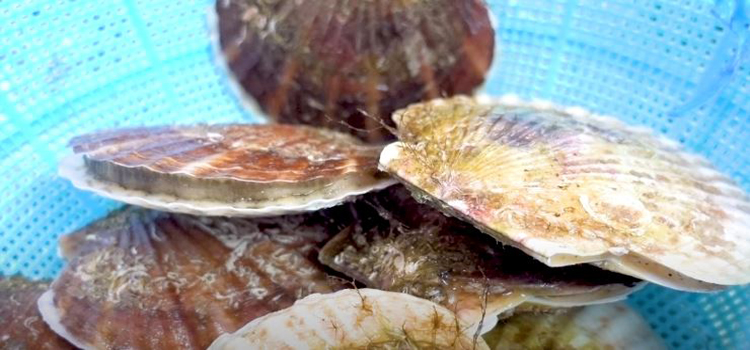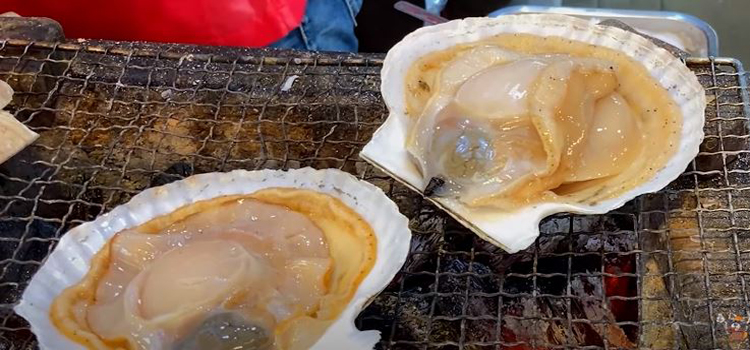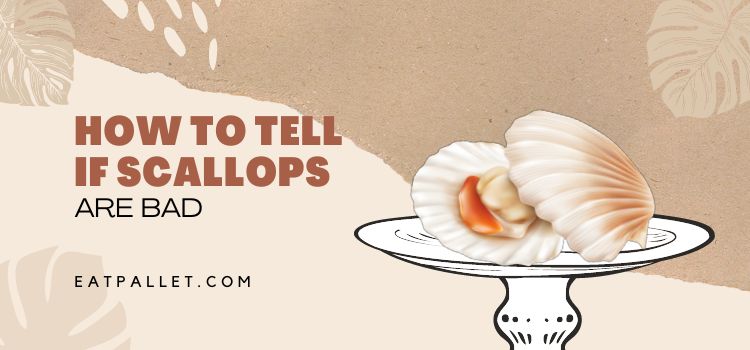Last Updated on September 11, 2024 by Shari Mason
It is always a delight to enjoy the sweet and delicate taste of scallops, a popular seafood choice. Unfortunately, it can be quite disappointing when ordering them at a restaurant and discovering they do not meet expectations.
In this blog post, we will discuss how to tell if scallops are bad and what to do if you end up with a batch of spoiled seafood.
How Can You Tell If Scallops Have Gone Bad?


If you’re not sure whether your scallops are still good to eat, there are a few things you can look for.
First, check the color of the scallops. Fresh scallops should be white or pale pink. If they are anything other than that, it’s a sign that they’ve gone bad.
Another thing to look for is the texture of the scallops. If they are slimy or sticky, that’s a sure sign that they’re no longer fresh.
Finally, give them a smell. Scallops should have a mild, ocean-like smell. If they smell fishy or rotten, it’s best to throw them out.
If you think your scallops might be bad, it’s always better to err on the side of caution and throw them out. Eating spoiled seafood can cause food poisoning, which is no fun for anyone. Find out how long imitation crab is good for here.
What Does It Look Like?
The best way to tell if a scallop is bad is by its color. A fresh scallop should be off-white or creamy, with a slightly translucent center.
If the scallop is more white or opaque, it’s likely past its prime. You can also check the texture of the scallop meat. If it’s rubbery or mushy, it’s time to toss it.
Read: How To Tell When Kimchi Is Bad?
What Does Bad Scallop Taste Like?
Bad scallops usually taste very fishy. If your scallops taste extremely fishy, they are probably bad, and you should throw them out. On the other hand, fresh scallops have a mild taste similar to lobsters and crabs.
How Does It Smell?


One of the most important ways to tell if your scallops are bad is by smell. Fresh scallops should have a mildly sweet ocean smell.
If your scallops smell fishy or like ammonia, they are not fresh, and you should discard them.
How Long Do Scallops Stay Fresh?
Once scallops are harvested, they begin to deteriorate quickly, usually within a day or two. Scallops are highly perishable seafood, so they don’t stay fresh for very long.
For this reason, it’s important only to buy fresh scallops that have been properly refrigerated.
Tips For Proper Storage
To keep scallops fresh, they should be stored in the coldest part of your refrigerator. They can be kept in their original packaging or a resealable bag. Scallops will stay fresh for up to three days when stored properly.
When it comes to cooking scallops, fresher is always better. If your scallops are starting to smell fishy or look slimy, it’s best to throw them out. These are signs that the scallops are no longer fresh and will not taste good.
Related Posts:
What Can You Do With Bad Scallops?
Unfortunately, there’s not much you can do with bad scallops. If they’ve gone bad, the best thing to do is to throw them out.
However, if you’re not sure whether they’re bad or not, you can try cooking them and see how they taste. If they don’t taste good, it’s best to throw them out.
If you find yourself with a batch of bad scallops, don’t despair. There are plenty of other delicious seafood items out there that you can enjoy. Just make sure to check them carefully before cooking or eating them to ensure they’re still fresh.
FAQs
How long can scallops last in the freezer?
Properly stored, scallops will maintain their best quality in the freezer for about 3 months.
What is the white stuff on scallops?
The white stuff on scallops is called the “corrupting matter” and is safe to eat. This is a natural occurrence that happens when scallops are exposed to oxygen. The white stuff comprises amino acids, sugars, and minerals leached out of the scallop’s muscle tissue.
How do you know if a scallop is fresh?
The easiest way to tell if a scallop is fresh is to smell it. Scallops should have a clean, salty sea air smell. If they smell fishy or like ammonia [1], they are not fresh and should be thrown out.
Can dried scallops go bad?
Dried scallops can last for several months if they are stored properly. If the scallops develop an off odor, flavor, or appearance, they should be discarded. Do not taste the scallops to see if they are good, as you could become ill from eating bad seafood.
How long will thawed scallops last in the freezer?
Scallops can be stored in the freezer for up to 3 months. Once thawed, they should be used within three days.
What is the best way to cook scallops?
There are many different ways to cook scallops, but some of the most popular methods include pan-frying, sauteing, grilling, and baking. Experiment with different methods to find the one that you like best. Just remember that scallops cook quickly, so don’t overcook them, or they will become tough.
Is it safe to eat raw or undercooked scallops?
Raw or undercooked scallops can contain harmful bacteria that can cause food poisoning. For this reason, it’s important to make sure they are cooked thoroughly before eating them.
Can you get sick from eating bad scallops?
Yes, you can get sick from eating bad scallops. Bad scallops can contain harmful bacteria that can cause food poisoning. Symptoms of food poisoning include nausea, vomiting, and diarrhea. See a doctor immediately if you think you may have gotten sick from eating bad scallops.
Final Thoughts
Scallops are a delicious and versatile seafood item that can be enjoyed in many different ways. However, it’s important to make sure they are fresh before cooking or eating them.
If you’re not sure whether your scallops are still good, the best thing to do is to throw them out. And if you find yourself with a batch of bad scallops, don’t despair.
There are plenty of other delicious seafood items out there that you can enjoy. Check them carefully before cooking or eating them to ensure they’re still fresh.
If you have questions about scallops or food safety in general, please feel free to comment below.
Reference:
- https://www.health.ny.gov/environmental/emergency/chemical_terrorism/ammonia_general.htm
- Can You Put an AC Unit in the Kitchen? - September 27, 2024
- What Cheese Does Olive Garden Use? Discover Their Signature - September 27, 2024
- How to Cancel a Pizza Hut Order? Quick & Easy Guide - September 24, 2024


